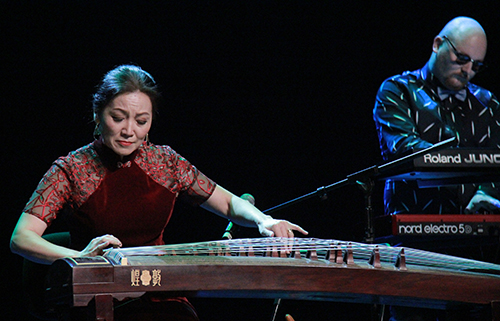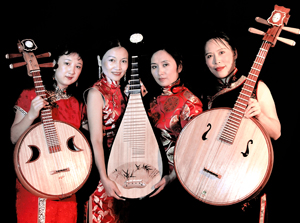The
Zheng Master-
Montreal Gazette- - -- - - --
- - -- - - --
- - --
Every once in a while an artist stands out for their depth, power, versatility, innovation, expression, excellence, and pure musicianship, for the zheng, for this time, that artist is Mei Han.
One of the world’s premiere zheng artists, Mei Han is a groundbreaking virtuoso propelling the Chinese zheng into radical new dimensions of musical expression. Presenting music deeply rooted in over two thousand years of Chinese culture, Han is transforming this stately instrument into a powerful tool for the contemporary international concert stage. She is a consummate performer, appearing with leading artists around the world in a multitude of musical genres from symphonic, chamber and New Music; to traditional and World music; and from Creative Improvisation to electronic.
Han began her music career at the age of sixteen and took a most sought-after position as a soloist at the prestigious Zhan You Ensemble in Beijing at the age of twenty. This was due to her extensive private studies with China’s top zheng masters Gao Zicheng and Zhang Yan. With the Ensemble, she toured to China and recorded for China’s National Recording Company and Beijing Radio Station. After moving to the West, Han’s performance career continues to span to Africa, Australia, Europe, North America, and other Asian countries. She performed with symphony orchestras, at major international festivals, and on concert tours with her ensembles Red Chamber, RC World, and the Mei Han Art Ensemble, as well as with her multi-instrumentalist husband Randy Raine-Reusch. Her performance highlights include WOMAD Australia and Singapore; the Rainforest World Music Festival in Borneo; the Concertgebouw in Amsterdam; WOW, BBC’s Women of the World Festival, Shanghai International Arts Festival, and appearances on CCTV 1 China’s Chant the Classics, and Guangzhou TV’s Grand Display of Chinese Music,each with an international audience numbering over 500 million. She has been featured in films and on radio/ TV networks including NPR (US), CBC (Canada), BBC (Great Britain), ABC (Australia), and NHK (Japan).
A dynamic performer and innovator, Han has been exploring new directions for solo zheng and zheng in unique combinations with other instruments in a contemporary experimental aesthetic. Works written for and premiered by Han include a zheng concerto by John Sharpley (premiered with China Philharmonic Orchestra, 2003), a composition for zheng and string quartet by John Oliver (premiered with Borealis String Quartet, 2004) and a work for zheng and harpsichord by Janet Danielson (premiered with Cynthia Hebert 2004). In addition, she has performed works by leading new music composers, such as works by John Cage, Lou Harrison, and Minoru Miki. Han is an active improviser performing with a host of prominent free jazz, new music, and world artists, including Paul Plimley, Howard Levy, Frank Gratkowski, Akikazu Nakamura, Ellory Eskelin, Wu Man, Debashish Battacharya, John Reischman, and many others. Her boundary-breaking practice is a case study in Michael Heffley’s book chapter “Improvising Mythoi and Difference Emerging in the Asian/Woman in North America,” in Sound Changes: Improvisation and Transcultural Difference, published by the University of Michigan Press, 2021.
Hans first solo CD, Outside
the Wall of traditional and contemporary
works, received critical acclaims, with airplay on CBC (Canada), BBC
(Great Britain), and ABC (Australia). Her collaboration with Randy
Raine-Reusch on Distant
Wind for zheng duet, and Road
to Kashgar with the Orchid Ensemble
were nominated for Juno Awards (Best Global). Han’s album Ume
with piano luminary Paul Plimley creates a rich and original musical
language in contemporary jazz aesthetic. Her album Redgrass
with Red Chamber features string band music from the Chinese imperial
court to Bluegrass and beyond, backed by mandolin master John Reischman and the
Jaybirds. The Redgrass Youtube video of Red Chamber with the Jaybirds became a viral internet sensation. Red Chamber's second CD Gathering became #1 on the College Radio Circuit, and Mei Han's third CD with Red Chamber, Classical and Contemporary Chinese Music, on the ARC label became top ten in Europe and won a Best World music nomination in Songlines Magazine.
Mei Han is a blend of artist and scholar. She received her doctoral degree in Ethnomusicology from the University of British Columbia, Canada, and two MA degrees from UBC and the Music Research Institute, Chinese National Academy of Arts, Beijing, China. As an internationally recognized scholar specializing in Chinese music, Han contributed the zheng entry for The New Grove Dictionary of Music and Musicians (2001) and entries for the zheng and other Chinese instruments for the The Grove Dictionary of Musical Instruments (2013), the premiere music reference books. She has published two book chapters and articles in music journals in both English and Chinese. Her unique position as an international performer and scholar was recognized by Bruno Nettl in The Study of Ethnomusicology: Thirty-Three Discussions (2015), the primary textbook for the discipline.
Han is recognized as a leading educator of international Chinese music education. She founded or directed Chinese Music ensembles in four North American High educational institutions. In 2015, Han was appointed the founding Director of the Center for Chinese Music and Culture at Middle Tennessee State University, where she created a museum of Chinese musical instruments and a research archival collection. Now established as a vital hub for cultural exchange between the United States and China, the Center operates various academic and outreach programs through instruction, performance, exhibitions, and scholar/student exchange.
A Professor of Music at MTSU, Han continues to lecture on Chinese music in numerous prominent universities and music institutes around the world. In recent years, she was the invited keynote speaker at the University of Georgia (2023), American Musicology Society (South Chapter) Annual Meeting (2022), Ukrainian National Tchaikovsky Academy of Music (Zoom, 2021), Tsinghua University, Beijing (2019), and Valparaiso University (2018). She was invited to be a faculty member at Silkroad Ensemble’s Global Musicians Workshop at the New England Conservatory (2023).
Personal History in Brief
Mei Han was born into a military family during the famines that followed the Great Leap Forward in China, her early years were during the Cultural Revolution. Life was not easy for Chinese then, food was scare, fear and politics were interchangeable. The army was considered a good life, as Mei’s family followed her father from posting to posting throughout China, from barren gray concrete army barracks to once one of Chairman Mao’s infrequently used villas. When music was allowed to be taught again, Mei’s family started her on zheng at 11 years old studying with the celebrated Shandong zheng teacher Gao Zicheng (1918-2010). To get there, she had to take a long distance bus by herself along rough rural roads every week with a basket of fresh eggs, oil, flour or rice on her lap as a gift for the teacher.
Five years later she was recruited by the army to play with the opera wing of the Qian Jin Song and Dance Troupe in Shenyang. Although far from home at a young age, the zheng saved Mei from the “re-education” her older sister had to endure in the remote countryside.
Two years later the ensemble sent Mei to study with Zhang Yan (1947-1996), considered the top zheng player in China at the time. Her return to Shenyang a year later was rocky and so at 20 Mei left for Beijing to see what fate would provide. There she applied for a position with the Zhan You Ensemble the leading group of its kind in China. She was surprised to be offered the position, beating out some of the top zheng performers in the country.
With Zhan You, Mei toured in old diesel buses with wooden seats on the back roads of China, and when lucky, by boat up remote rivers. These tours took her throughout Inner Mongolia, along the Mongolian, Russian and Chinese borders and to the extreme northern forest of China, visiting remote outposts to do small concerts. Sometimes in the middle of their performances Russian helicopters would rise up on the other side of the river to see what was taking place.
After six years with Zhan You, Mei started to lose interest in performing as the ensemble’s music became influenced by Hong Kong pop music. Instead, she learned English as another skill, and within a short time found herself editing music books and translating ethnomusicological articles for Chinese music journals.
In late Spring, 1989, Mei was living not far from Tiananmen Square. All of Beijing at the time was full of hope for change, and even police and soldiers had joined the demonstrations. On the fateful night of June 3rd, Mei sat in horror in her dormitory as the sound of gun fire filled the air throughout the whole night. At daybreak she ventured out, going to one of many small local hospitals to see dozens of dead and wounded. She felt betrayed by the government, and the army she had once belonged to.
The events at Tiananmen opened Mei’s eyes and made her start to question everything. Mei started to study psychology and sociology privately. When her English was strong enough, Mei entered the prestigious Chinese Music Research Institute in musicology. For her Master’s thesis she undertook field research of the Dong minority, travelling at great personal peril to extremely remote mountain villages, some known for poisoning their guest’s food. Mei received her first Master’s degree in 1995.
In 1996, Mei came to Canada to do a second Master’s in Ethnomusicology at UBC. She began performing again and brought all her past experiences to bear in the West to break musical boundaries, taking the zheng into a multitude of new genres, and developing radical new repertoires for her instrument. As such Mei has become a world renowned zheng virtuoso; become the leading authority on the zheng; written for the world’s leading reference books on music: and been the feature of numerous radio and television documentaries. With a Ph.D. in Ethnomusicology from the University of British Columbia,Mei Han taught Ethnomusicology and Anthropology, along with the Chinese Music Ensemble at Kenyon College in Ohio for two years. Dr. Han is currently the Director of the Center for Chinese Music and Culture at Middle Tennessee State University while continuing to perform worldwide.







